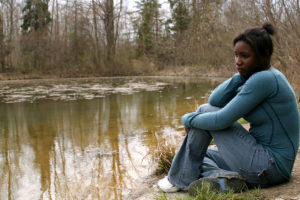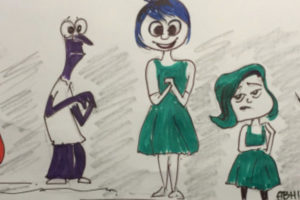Is the latest science at odds with current popular understandings of depression, the world’s largest source of disability? That’s the question Center for Healthy Minds Professor Charles Raison and fellow Co-Author Vladimir Maletic have posed in a new book The New Mind-Body Science of Depression for clinicians and mental health professionals. Raison, the Mary Sue and Mike Shannon Chair for Healthy Minds, Families & Children at the UW–Madison School of Human Ecology, sat down to share insights from decades working with patients and researching new ways to treat depression.

In your new book, you suggest a shift in our current thinking regarding depression. Why?
Depression is not as discrete as we currently think, and there are several lines of evidence arising to support this. First, it’s unbelievably common. The diagnostic tools we have are useful and important, and I personally don’t think we’ll come up with anything better in the very near future, but they’re increasingly out of line with what we know. We don’t know exactly what depression is, but we’re increasingly recognizing that it’s not a single “disease.” Why does one person develop depression while someone else develops generalized anxiety while somebody else becomes manic and has a break – that’s what we don’t understand very well. One thing we write about in this book is that in the literature and studies, depression seems to be less of a discrete disease and more of an evolved response to adversity.
So there’s something about how our ancestors lived that gave rise to depression?
Yes, and I subscribe to an evolutionary perspective suggesting that things we see that are passed on from generation to generation exist because they somehow enhanced our ability to reproduce and pass on our genes in the environments in which we evolved. And if you think about it, the things that make people depressed today are the same sort of things that had a good reason to make people who lived in smaller hunter-gatherer societies depressed. These things reliably signaled a real threat to life and limb – things like being ostracized, not being part of the group, having lower status in the group or being infected. These things mattered greatly for a person’s ability to influence others, to stay healthy and to reproduce. These areas were threats to survival and illness, and we believe one of the reasons for depression’s evolution is that it signaled that an individual was at a real risk of failing to fulfill evolution’s mandates.
Fast-forward to today. People don’t get depressed because they wake up in the morning and think, “I’m failing at reproduction or surviving.” What we do get upset about are thoughts like “What will people think? People don’t like me.” Clearly, they’re not adaptive in the same way, but if you read the anthropological literature of hunter-gatherers, not belonging in the group can be a life-and-death issue that can have a huge impact on a person’s ability to survive and reproduce.
"We don’t know exactly what depression is, but we’re increasingly recognizing that it’s not a single “disease."
What benefit did depression have in order for it to serve an evolutionary purpose?
Social factors make us depressed because these factors were life and death issues across much of human evolution. The same thing pertains for sickness. If you look at some – not all – people with depression, they have chronically elevated inflammation. We’ve made this argument, as others have, that this may be an evolved, adapted mechanism, and that part of the reason why depression came into being was that it grew out of sickness. When someone was sick, the immune changes that become activated and produce depression are known to help survival. And many of the symptoms of depression, like sickness, helps conserve energy for fighting the infection and/or cause people to withdraw, which protects them from further infection to which they are liable when sick. This would explain why when the going gets tough, people with depression don’t get going; it’s because we evolved a range of responses that included a predisposition to develop a sort of depressive type reaction – you might not want to get up and move around, you lose interest in things and you avoid strangers because strangers’ microbial bugs are definitely more dangerous than your family’s bugs when you’re already sick.
When it comes to giving recommendations to clinicians, psychiatrists and counselors, how can new research findings improve treatment?
A lot of this stuff is at the cutting edge, and the treatments haven’t all caught up with the latest science. For instance, take meditation. If your brain-body complex is sending signals common in depression that you are going to die or fail, those signals may or may not be true. In the modern world, there’s an evolutionary mismatch, and these signals are generally not true. We have inherited these ancient signals, and much of the time they produce misguided anxiety and misery. Meditation, which attempts to recognize that your thoughts are just thoughts, is relevant here, and you’re more likely to be aware when you’re misreading things or spinning a narrative.
There are other things, including hyperthermia work we’ve done, that grow out of these ideas directly. The idea is to work with these peripheral signaling pathways in ways that provide the brain with a different set of messages—messages of safety and/or well-being.
It may sound provocative, but do you think depression is curable?
In some people, yes. There are some people who have a bout of depression, and you can help them through it, sometimes just naturally, and they don’t get depressed again. There are other people (some 30 percent of cases) who, even with our current state of technology, we can’t get un-depressed. This is one of the things that really drives my work to reintegrate what people discovered thousands of years ago into the modern world. Even if we can’t completely cure it, can we help people have a different relationship with their emotions and their feelings? Can we help people, if they can’t benefit from treatments, at least not be so harmed?
I believe there’s a need to humanize depression. Often in my experience as a clinician, what makes people depressed is they come up against something in their make-up or something about the way they are in the world, that is causing them trouble, and they can’t get over it, transcend it, or transform it. I’m fascinated by the fact that we’re so interconnected with our environment, even at the microbial level. My informal advice for people interested in this topic or those with depression is to the best of your ability, try to find win-win scenarios. I think many, many people that are now struggling with depression and are not winning the battle – if they can hang in there, I think we are on the edge of becoming better at helping people either get rid of depression or transmute it into a powerful force for good in their lives.
Interview conducted and edited by Marianne Spoon






